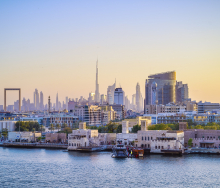Following a year of global climate extremes, the need to ensure greener practices in travel has become even more necessary.
“Regenerative (travel) transformation has long been demanded by the planet, and now it’s being demanded by people too!” says Martin Raymond, Co-Founder of The Future Laboratory.
Intrepid Travel’s collaborative report with The Future Laboratory, Sustainable Future for Travel, navigates the environmental, social, cultural and technological changes in the travel industry and the trends that will follow.
Chasing the shade
Rather than chasing the sun, travellers are seeking cooler destinations, as others may be plagued by heatwaves, wildfires and drought, risking their safety and health. Peak seasons, either on snowy mountains for skiing or warm beaches to sunbathe, will shorten as the snow melts faster and the sun’s heat reaches new highs.
Carbon passports and carbon footprint tracking
Revenge travel showed how access to unlimited flights could be exploited, but this could change.
As traveller focus shifts towards sustainable values and policies to ensure sustainable practices, personal carbon emission limits and real-time personal carbon footprint tracking will become the new norm.
“On our current trajectory, we can expect a pushback against the frequency with which individuals can travel, with carbon passports set to change the tourism landscape,” says Raymond.
Virtual vacations
360-degree videos, virtual tours, airline and hotel offerings, metaverse clones of destinations and other virtual and augmented experiences may no longer be a pandemic-centric travel experience. If climate change is not addressed, tourist hotspots may become less travel-friendly, and virtual vacations may become the only option to explore far-off destinations.
Accommodating Gen-Z and Gen Alpha
According to the report survey, travellers between the ages of 16 and 25, dubbed Travel Transformers, have a genuine concern for the state of the planet and its people. The report predicts that by 2040 it will be unusual to find them without carbon footprint trackers on their smartphones. It also says that these Travel Transformers will continue their fight against greenwashing campaigns that cannot display tangible results and for gender inclusivity in the travel industry.
“This generation, who are predicted to be the largest in history, will have massive staying power and influence. It will leave the travel industry no choice but to respond to their expectations and act accordingly,” says the report.
People-positive travel
Regenerative travel focuses on the holistic impacts of travel and prioritises positive social and cultural impacts that will shift the industry from product-led to socially-led. The regenerative travel movement considers how it can leave smaller footprints in foreign destinations and highlights its contribution to local economies.
“Travel used to be all about the features, like the fancy hotel or the exotic destination, but increasingly it is about people,” says Darrell Wade, Co-Founder and Chairman of Intrepid Travel.
The report predicts that future regulations will require travel businesses to ensure that tourist spend will stay within local communities.
Transient accommodation
While travel is naturally fleeting, fresh nomadic hospitality concepts and flexible accommodation concepts are on the rise.
As popular tourist cities struggle with space and limited infrastructure, experimenting with mobile accommodation will benefit travellers’ connections with new places and geographic barriers.
“A new era of transformative travel experiences will lead to hotels taking the concept of leaving no trace quite literally,” says Raymond.














